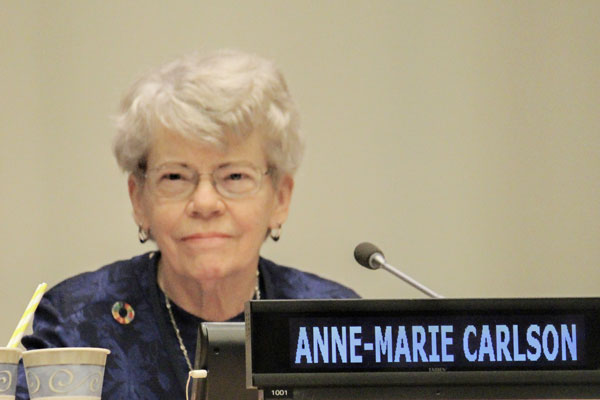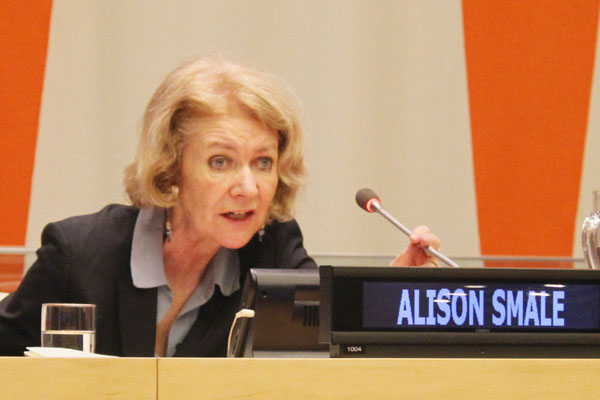Conference Welcomes
- Anne-Marie Carlson, Conference Chair
- Alison Smale, UN Department of Global Communications (DGC), formerly the Department of Public Information (DPI)
On behalf of CTAUN, Anne-Marie Carlson, Chair of CTAUN and Conference Chair, welcomed close to 600 attendees, including several Fulbright scholars, educators and students from Sweden, Manhattanville College, Norwich University, the College of St. Joseph, Lehman College, Bellport High School, the Brown School, Mott Hall HS, Raritan Valley Community College, the Taft School and the Wardlaw Hartridge School, Ambassador Park from the Republic of Korea, leaders from the The Delta Kappa Gamma Society International, Childhood Education International, and new and past conference participants.
She paid tribute to the faculty and students of Bridgeport and Lehigh Universities for their invaluable assistance with AV coverage, poster contest displays and as conference guides, and reviewed the conference folder.

With respect to our choice of conference title, she pointed out what may be an eye-opener to some: climate issues aren’t new. A short video, entitled Global Warming – https://www.youtube.com/watch?v=MU9s0XyEctI from 1980 followed as an illustration. In that video, Journalist Walter Cronkite spoke of the greenhouse effect caused by coal, oil and natural gas emitting CO2 into the earth’s atmosphere; he warned of its consequences for health, agriculture, and sea level rise from melting ice caps that would engulf coastal cities in the next 30-50 years. Ms. Carlson questioned how much progress we’ve actually made in the 39 year interim and then introduced
Alison Smale, Under-Secretary General for Global Communications, gave the formal UN welcome. Echoing UN Secretary-General Antonio Guterres, who referred to climate change as the “defining issue of our time”(see our resource list for his remarks) and the Cronkite video, Ms. Smale said that as early as 1946, the UN Economic & Social Council (ECOSOC) promoted sustainable development worldwide. Yet since then, human activity has continued to cause degradation. She spoke about real and dire consequences of extreme weather patterns, plus water insecurity threatening the social and economic stability necessary for peace, and warned of apathy and resignation. “We know the problems, and we have the solution – unclean energy must end. We need the will to act,“ she said. Only through international cooperation can we hope to reduce carbon emissions to the required 1.5 degrees Celsius by the 2030 deadline. She stressed that teachers and students can be powerful change agents in this effort.

